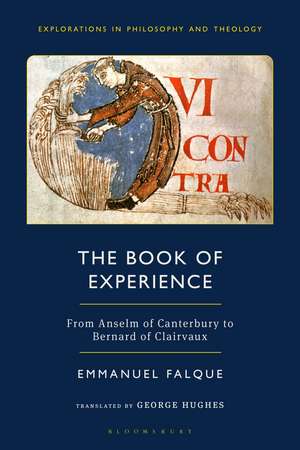The Book of Experience: From Anselm of Canterbury to Bernard of Clairvaux: Explorations in Philosophy and Theology
Autor Emmanuel Falque Traducere de George Hughesen Limba Engleză Hardback – 24 ian 2024
Preț: 511.40 lei
Preț vechi: 731.78 lei
-30% Nou
Puncte Express: 767
Preț estimativ în valută:
97.89€ • 106.36$ • 82.28£
97.89€ • 106.36$ • 82.28£
Carte tipărită la comandă
Livrare economică 21 aprilie-05 mai
Preluare comenzi: 021 569.72.76
Specificații
ISBN-13: 9781350386495
ISBN-10: 1350386499
Pagini: 272
Dimensiuni: 156 x 234 x 24 mm
Greutate: 0.56 kg
Editura: Bloomsbury Publishing
Colecția Bloomsbury Academic
Seria Explorations in Philosophy and Theology
Locul publicării:London, United Kingdom
ISBN-10: 1350386499
Pagini: 272
Dimensiuni: 156 x 234 x 24 mm
Greutate: 0.56 kg
Editura: Bloomsbury Publishing
Colecția Bloomsbury Academic
Seria Explorations in Philosophy and Theology
Locul publicării:London, United Kingdom
Caracteristici
Engages in a profound conversation with a wonderful range of authors from the late 11th and 12th centuries: Anselm of Canterbury, Bernard of Clairvaux, Aelred of Rievaulx, and both Hugh and Richard of St. Victor
Notă biografică
Emmanuel Falque is Professor of Philosophy and Honorary Dean of the Faculty of Philosophy at the Catholic University of Paris, France. He has published widely in phenomenology, philosophy of religion and medieval philosophy. His most recent publications include Nothing to It (2020), The Guide to Gethsemane (2019), The Loving Struggle (2018), and Crossing the Rubicon (2016). Falque is also the founder of the rapidly growing International Network of Philosophy of Religion.
Cuprins
OpeningIntroduction: Talking About Experience Part I: The Theophanic Argument, or Experience in Thought: Anselm of Canterbury 1. Of God Who Comes to Mind2. The Theophanic Argument3. The Debt for the Gift Part II: Hermeneutics and Phenomenology or the Experience of the World: Hugh and Richard of Saint-Victor 4. God an "Open Book" 5. To Live One's Body 6. The Third Party of Love Part III: Affectivity and Spirituality or Experience in Affects: Aelred of Rievaulx and Bernard of Clairvaux 7. To Feel Oneself Fully Alive 8. Experience and Empathy 9. Openness [apérité] and Freedom Epilogue: Hold Fast to HumankindIndex
Recenzii
With his characteristic erudition and clarity, Emmanuel Falque draws our attention to the nature of experience by plumbing the rich resources of Christian mysticism and monastic theology. He demonstrates that experience is never simply a matter of self-knowledge or empirical inquiry; it puts us to the test, changing and transforming us. The result is a text full of wisdom and rich insight, and one of remarkable and unexpected relevance for contemporary phenomenology.
How does God enter into finite human thinking and feeling? Like the wise householder sharing treasures old and new, Emmanuel Falque shows how Christian monasticism remains a surprisingly fresh interlocutor today. A master class in the precise, generous listening to the premodern past that is renewing theology and phenomenology alike.
How does God enter into finite human thinking and feeling? Like the wise householder sharing treasures old and new, Emmanuel Falque shows how Christian monasticism remains a surprisingly fresh interlocutor today. A master class in the precise, generous listening to the premodern past that is renewing theology and phenomenology alike.



